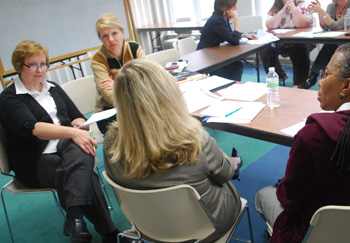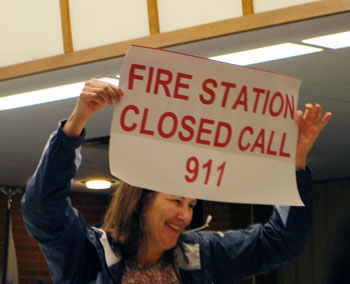Literacy Coalition Faces Uncertain Future
In April 2010, Washtenaw County commissioners marked a transition – handing over leadership for a literacy coalition the county had spearheaded.

At left, Amy Goodman, executive director of Washtenaw Literacy (a different entity from the Literacy Coalition of Washtenaw County), led the Sept. 26 membership meeting of the Literacy Coalition of Washtenaw County.
At the time, the Literacy Coalition of Washtenaw County had just hired its first executive director – Vanessa Mayesky – and reported progress in goals outlined in the county’s ambitious Blueprint to End Illiteracy.
But at a recent working session of the county board, commissioner Rob Turner reported that the coalition is now in crisis.
Mayesky resigned earlier this month to take a job at the University of Michigan, and funding for the coalition’s efforts is nearly depleted. Amy Goodman, chair of the coalition’s steering committee, had sent out an email on Sept. 20 stating that the coalition is at a crossroads. Based on the coalition’s financial situation, action needed to be taken, she wrote – and one of the options is to dissolve the coalition.
Goodman’s email was also a call for supporters to attend a Sept. 26 membership meeting at the NEW Center, to give input on the future of the coalition. At that meeting, which The Chronicle attended, Goodman and other steering committee members outlined the status of coalition finances. The faltering economy has tightened funding from both private and government sources, and the situation has been made even more challenging by a new coordinated funding approach being used by the county, city of Ann Arbor, Washtenaw United Way and other funders.
The coordinated funding focuses on six community priorities, ranging from homelessness to health care. But despite intense lobbying from coalition members – who noted that illiteracy is at the root of nearly every other social challenge, including unemployment and poverty – literacy is not on that list of coordinated funding priorities.
Options discussed at Monday’s meeting include: (1) trying to operate the coalition at a fully-funded level, which would entail raising funds for an annual budget of at least $71,000; (2) operating at a significantly reduced capacity, with a part-time coordinator and annual budget of $45,000; (3) creating a volunteer group to continue the effort; or (4) dissolving the coalition completely. [Full Story]






